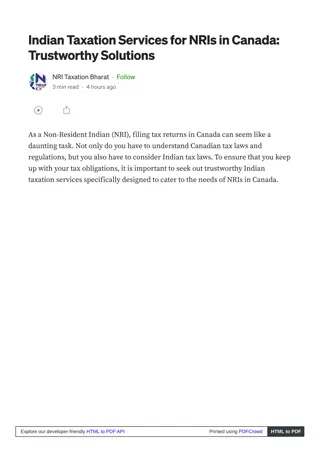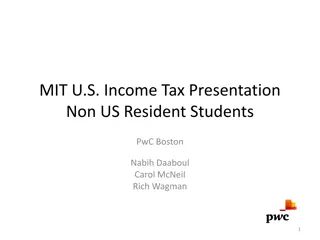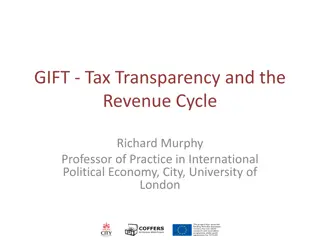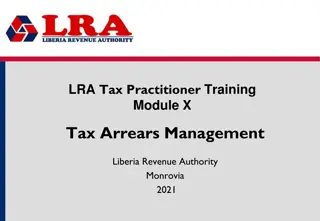
Oregon Local Income Tax Update - Recent Changes Impacting Business Taxes
Stay informed about the recent changes in Oregon's local business income taxes, including updates on Metro, Multnomah County, and the City of Portland. Learn about proposed code changes and ordinances affecting apportionment and allocation of income. Find out how these changes align City of Portland's tax laws with state regulations for better conformity.
Download Presentation

Please find below an Image/Link to download the presentation.
The content on the website is provided AS IS for your information and personal use only. It may not be sold, licensed, or shared on other websites without obtaining consent from the author. If you encounter any issues during the download, it is possible that the publisher has removed the file from their server.
You are allowed to download the files provided on this website for personal or commercial use, subject to the condition that they are used lawfully. All files are the property of their respective owners.
The content on the website is provided AS IS for your information and personal use only. It may not be sold, licensed, or shared on other websites without obtaining consent from the author.
E N D
Presentation Transcript
To earn CPE credit, be sure to respond to the polling questions. Participation counts, answers do not need to be correct Please do not use the full screen mode as it may prevent you from responding to the polling questions Please submit any questions that you have using the Question section
Oregon Local Income Tax Update Presented by Melissa Roberts 2022-23 Portland Tax Forum November 3, 2022
Oregon local business income taxes impacted by recent changes Metro business income tax Multnomah County business income tax City of Portland business license law Top marginal rate 1% on the net income of each person doing business within the Metro District 2% of the net income from business within Multnomah County 2.6% of adjusted net income z 3
Proposed code changes In June 2022, Metro, Multnomah County and the City of Portland proposed changes to their business income tax codes. The City of Portland Revenue Division administers these taxes on behalf of Metro and Multnomah County. z 4
City of Portland Ordinance 191010 Amends Portland Business License Law Code related to the apportionment and allocation of income (amend Code Chapter 7.02) Passed by Portland City Council, September 28, 2022. z 5
City of Portland Ordinance 191010 Both the City of Portland and the State of Oregon used Cost of Performance apportionment for services through 2017. The State of Oregon adopted Market-Based Sourcing apportionment for services beginning with 2018. The City of Portland still uses Cost of Performance apportionment. Generally, it is desirable for the Business License Law to be in conformity with the state s income tax law. These changes bring City of Portland back into conformity with the state. z 6
Portland Ordinance 191010 It is necessary to amend the apportionment section of the Business License Law to achieve greater conformity with the State of Oregon statutes to adopt Market-Based Sourcing of sales for income from services and intangible assets. z 7
Metro Ordinance No. 22-1484 WHEREAS, these proposed Metro Code changes not only align with Oregon Tax Law, but they also align with changes recently adopted by the Portland City Council and the Multnomah County Board of Commissioners to their respective business income tax codes, thus making tax filings easier, less costly, and more efficient for businesses; - Ordinance No. 22-1484, For the Purpose of Amending Metro Code Chapter 7.07 Related to Apportionment and Allocation of Income to Better Align with Oregon State Income Tax Apportionment Law for Certain Businesses z 8
Ordinance Amending Multnomah County Code Chapter 12 - Business Income Tax By agreement between City and County, City of Portland collects and administers the County BIT; the City also collects and administers Metro BIT. To simplify the administration of the three taxes (including City BIT) and to align the County s BIT code with the City/Metro BIT codes, the County proposes amending the County BIT code for tax years beginning January 1, 2023. z 9
Uniform Division of Income for Tax Purposes Act (UDITPA) UDITPA, codified at ORS 314.605 to 314.675, apportions income earned by unitary businesses that operate within and without Oregon. Sales, other than sales of tangible personal property, are in this state if the taxpayer s market for sales is in this state, as determined under ORS 314.666. ORS 314.665(4). A taxpayer s market for sales is in this state:***In the case of the sale of a service, if and to the extent the service is delivered to a location in this state. ORS 314.666(1)(c). z 10
Amends PCC 7.02.100 1. Proposed Code Section 7.02.100 Definitions changes: Q. Non-business income means income not created in the course of the taxfiler s business activities. z Q. Non-business income has the same meaning as nonapportionable income defined in Oregon Revised Statutes 314.610. - City of Portland Ordinance 191010 11
Amends PCC 7.02.610 A. Jurisdiction to tax occurs when a person engages in business activities in a jurisdiction that are not protected from taxation by Public Law 86-272. The City of Portland s (City) standard for jurisdiction to tax, or nexus, is the same as the State of Oregon s found in the Oregon Revised Statutes and Oregon Administrative Rules related to taxation. Public Law 86-272 applies to interstate sales of tangible personal property. For purposes of the Business License Law, the limits imposed by Public Law 86-272 for interstate jurisdiction to tax shall also be presumed to apply on an intrastate basis. If a taxpayer s business is based in the Portland City, a taxpayer must have business activity outside the Portland City that results in a jurisdiction to tax outside the Portland City to apportion the income of the business. Without jurisdiction to tax outside the Portland City, all income of a business is taxable by the Portland City. z - City of Portland Ordinance 191010 12
Amends PCC 7.02.610 C. In computing the business license tax, taxfilers that have income from business activity both within and without the City must determine the income apportioned to the City by multiplying the total net income from the taxfiler s business by a fraction, the numerator of which is the total gross income of the taxfiler from business activity in the City during the tax year, and the denominator of which is the total gross income of the taxfiler from business activity everywhere during the tax year. The City adopts the apportionment and allocation provisions found in the Oregon Revised Statutes, Chapters 314, 317, and 318 and related Oregon Administrative Rules unless otherwise provided in this chapter or by administrative rule. All references to Oregon or the state should be read as referring to the City. All business income must be apportioned to the City by multiplying business income by the sales factor only. - City of Portland Ordinance 191010 z 13
Amends PCC 7.02.610 D. In determining the apportionment of gross income within the City under Subsection 7.02.610 C.: 1. Sales of tangible personal property are deemed to take place in the City if the property is delivered or shipped to a purchaser within the City regardless of the f.o.b. point or other conditions of sale. If sales of tangible personal property are shipped from the City to a purchaser located where the taxfiler is not taxable, those sales are not apportioned to the City. 2. Sales other than the sales of tangible personal property are deemed to take place in the City if the income producing activity is performed in the City. z - City of Portland Ordinance 191010 14
Amends PCC 7.02.610 E. Certain industries or incomes are subject to specific apportionment methodologies. *** All apportionment methodologies directed under this Chapter will be a single factor gross income sales apportionment as directed under Subsections 7.02.611 C. In those specific cases where Oregon has directed allocation of income, such income will be apportioned for purposes of this Chapter, unless allocation is otherwise allowed in this Chapter. F. If the apportionment provisions of Subsection C. do not fairly represent the extent of the taxfiler s business activity in the City and result in a violation of the taxfiler s rights under the Constitution of this State or the United States, the taxfiler may petition the Division to permit the taxfiler to: 1. Utilize the method of apportionment used by the taxfiler under the applicable laws of the State of Oregon imposing taxes upon or measured by net income; or 2. Utilize any other method to effectuate an equitable apportionment of the taxfiler s income. - City of Portland Ordinance 191010 z 15
Proposed Administrative and Housekeeping Changes City of Portland Ordinance 191011 Amends definitions and timing provisions in PCC 7.02 regarding notice of protest and waiver. Deletes sentence in PCC 7.02 regarding Public Law 86-272. Amends citation to Oregon Administrative Rules. z 16
Melissa V. Roberts Tax Attorney (503) 294-9588| melissa.roberts@stoel.com About Melissa Melissa Roberts is an associate in the tax section of Stoel Rives Benefits, Tax, and Private Client group. She assists businesses and individuals with a variety of federal, state, and local tax issues. She has represented clients in the Oregon Tax Court and regularly assists clients in administrative appeals before state and city revenue agencies. z Before joining Stoel Rives, Melissa was a judicial law clerk to the Honorable Robert Manicke of the Oregon Tax Court (2018 2020). During her clerkship Melissa worked on tax appeals involving a variety of state and federal tax issues, including personal and corporate income tax, tax credits, nexus, apportionment, centrally assessed property, and tax- exempt organizations. While in law school, Melissa was a judicial extern to the Honorable Martha L. Walters of the Oregon Supreme Court (2016). 17




![Town of [Town Name] Real Estate Tax Rates and FY 2024 Budget Summary](/thumb/62211/town-of-town-name-real-estate-tax-rates-and-fy-2024-budget-summary.jpg)

















